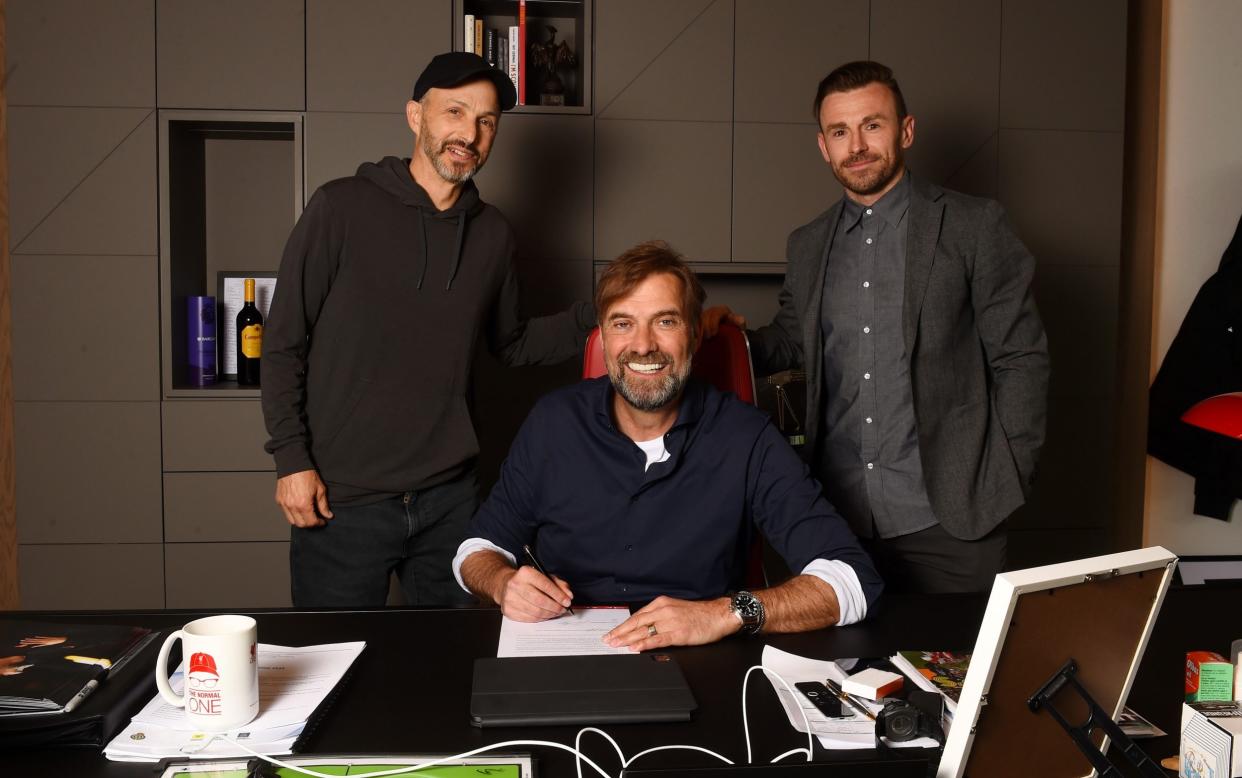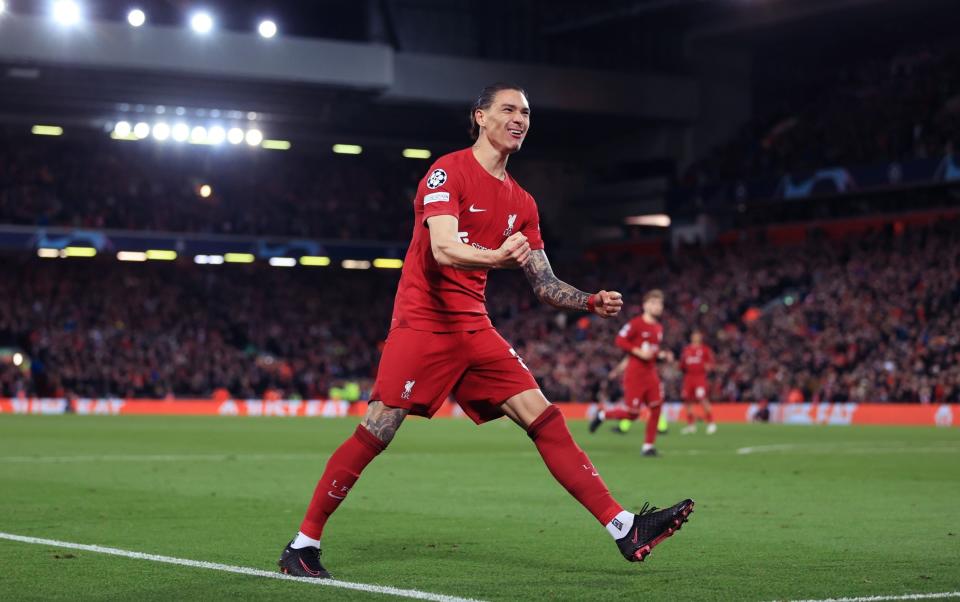Liverpool sporting director Julian Ward quits just six months after Michael Edwards' departure

Liverpool sporting director Julian Ward has quit just six months into his role as one of the club’s key executives.
Ward replaced the highly-rated Michael Edwards during the summer but has informed owners Fenway Sports Group he wants to take a break from football at the end of the 2022-23 season. He will stay in post until the summer.
Liverpool sources have described the decision as "unexpected and disappointing" and insist a sense of continuity in recruitment will be retained with head of recruitment Dave Fallows and chief scout Barry Hunter possible successors.
But there is no escaping a sense of a prolonged period of stability at the top of Liverpool unravelling with Ward’s decision so closely following Edwards’ departure, FSG president Michael Gordon "stepping back" from day-to-day duties, and – most significantly – the owners actively inviting bids for their shares.
The club’s owners now face a huge task to reassure that what from the outside appears to be a tumultuous period is not representative of what is going on inside the club.
Ward has been at Liverpool 11 years and worked closely with Edwards, so there is bound to be speculation he may reconnect with his mentor once he has made his next move. That theory has gained more momentum because Liverpool's director of research Ian Graham is also set to leave the club.
The Liverpool-born director was promoted in the aftermath of Edwards’ quitting and hit the ground running by securing a new deal for Mohamed Salah and the signing of Darwin Nunez, which may be worth £85 million. He also negotiated the sale of Sadio Mane to Bayern Munich.

Ward was at the forefront of the ongoing transfer strategy and will still be in charge of luring manager Jurgen Klopp’s transfer targets for next season – England star Jude Bellingham top of that list.
Liverpool say Klopp will be integral to determining the recruitment model they adopt moving forward. The manager remains the most important football figure at Anfield and is said to be calm about the changes around him. That cannot disguise the speed and extent of those executive moves.
Gordon has allowed chief executive Billy Hogan to assume many of his day-to-day duties. Hogan is a highly respected figure with strong relationships with everyone at the club.
Liverpool also believe the backroom team of analysts assembled by Edwards and Ward will ensure there will be no disintegration of a recruitment department which has been the envy of the Premier League in terms of the value for money of the overwhelming majority of signings since Klopp's appointment in 2015.
But there has been criticism of the club recently that the spending limits are taking their toll on their ability to keep pace with Manchester City, Liverpool unable to offer rival packages for some of the highest salaried players.
Klopp said recently 'Liverpool cannot compete' and recent events give substance to that claim, reflected in the announcement that FSG is seeking new investment. It remains to be seen how influential that sense of having to keep up with a material economic disadvantage has been on the decision of two highly rated sporting directors.
Edwards and Ward were under immense pressure to deliver superstar signings at a club which - despite all its recent success – is still having to sell big before spending big.
Analysis: The executive branch at Anfield looks like it is unravelling
To lose one sporting director could be considered unfortunate.
To lose the shrewdest man in the Anfield boardroom might be thought worrying.
To lose another sporting director within the space of six months looks careless.
Throw in Liverpool owner Fenway Sports Group’s willingness to sell their shares and you can be forgiven for thinking the executive branch of Anfield is unravelling.
The image is evoked of Jurgen Klopp returning to the training ground after the World Cup entrusted with extinguishing a raging bonfire, the top of the club seemingly as unstable as at any time since 2010 as Julian Ward became the latest to issue his intention to vacate the premises.
Mercifully, Liverpool are not quite yet at the Tom Hicks and George Gillett Jnr state of emergency yet, but no matter what spin is put on recent events, the optics are worrying.
At least Klopp committed to a new deal last summer, and his remarks after Liverpool’s last home game against Southampton that he will stay "no matter what" now seem more pertinent than ever. Nobody is more important to Liverpool than him. He is the chief architect of the Anfield renaissance, those around benefiting from touching the hem of his greatness.
But that cannot downplay the significance of the executive changes given how much Liverpool’s progress owes to a prolonged period of serenity.
Ward informed FSG of his intention to quit as sporting director just before the World Cup began. Klopp, who once described the sporting director title as an example of ‘giving a dog a new name’ is understood to be more relaxed about developments than those on the outside looking in.
Talk to the right people at Liverpool and they will say the timing of each announcement is coincidental and unrelated.
Michael Edwards left as sporting director last summer because he wanted a break, re-energising himself for an as yet unspecified fresh challenge. There is some surprise that he has not turned up at a Premier League rival yet, especially as he has been linked with similar roles at Chelsea and Manchester United.
FSG president Gordon’s decision to step aside from day to day duties (he has always worked from the United States anyway) is thought to be more about the capability of England-based chief executive Billy Hogan to assume more powers. Gordon has reduced his powers of responsibility rather than completely disconnected.
'Off-field uncertainty can contaminate on-field performance'
Ward, meanwhile, was thought to have his dream job when he replaced his mentor last summer, and was credited with ending the Mohamed Salah contract impasse and swiftly negotiating Darwin Nunez’s transfer.
But when so much happens within such a short period, it is inevitable dots will be connected. It cannot be shrugged aside how openly Liverpool are conceding the difficulty they are having in keeping pace with Manchester City at the top of the Premier League.
There is an unavoidable sense of everyone at Anfield believing they have taken the club as far as they can without another injection of cash. We are not yet in the midst of a takeover saga circa 2003-10, but those who remember that period will feel it is in the post. That creates an uncertainty which – if not handled astutely – can contaminate on-field performances.
Liverpool fans are entitled to be concerned. No wonder they are watching Jude Bellingham’s England performances with mixed emotions.
Every touch of class in England’s first game against Iran led to WhatsApp message pings of 'best add another £25 million on the asking price'. The more Bellingham’s price soars, the less likely it is he is Anfield-bound.
Like it or not, the announcement FSG are inviting offers for the club increases the pressure on them to deliver a big signing at the end of the season. If they fail to sign Bellingham after making it known the club is waiting a year 'to get the right midfielder rather than any midfielder' there will be accusations they are more interested in selling the club and reaping the rewards of a £4 billion dividend than the long-term health of the team. Why care about the next four years if you may not be around? That would be simplistic and unfair. That is football.

The reality is Bellingham, valued at more than £100 million, already looks beyond Liverpool’s means unless a new investor is found, or another star player is sold. Liverpool could only buy Darwin Nunez and afford Mohamed Salah’s new contract because they sacrificed Sadio Mane.
No matter how vociferously it is argued otherwise, it is hard to believe that reality did not impact Edwards' decision a year ago, and has not had some bearing on Ward moving on so soon.
Not for the first time, it will be left to Klopp to reassure that appearances are deceptive and Liverpool are not about to regress.
After the last major sporting event in Qatar, December 2019 World Club Cup, Telegraph Sport’s match report on Liverpool’s win read thus: “There is no question the influence of sporting director Michael Edwards and FSG president Mike Gordon – and the shrewdness of John W Henry and Tom Werner in getting those appointments pitch perfect - is fundamental to facilitating Klopp's work.”
Edwards has gone, Gordon’s workload has reduced, and he, Henry and Werner are open to the idea of selling their stake.
It is not quite the end of an era at Anfield, but unless there is a billionaire who prefers owning Liverpool rather than Manchester United it is threatening to be the beginning of the end of one.

 Yahoo News
Yahoo News 
